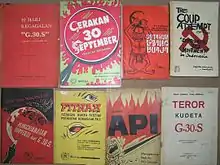印度尼西亚大屠杀 (1965年—1966年)
1965-1966年的印度尼西亚大屠杀(印尼语:Pembunuhan Massal Indonesia & Pembersihan G.30.S/PKI),也称为印度尼西亚种族灭绝、印度尼西亚反共大清洗,是指发生在印度尼西亚,在美国以及其它西方国家的支持下,受印尼军队及政府的煽动,针对当地印度尼西亚共产党(PKI)成员、亲共产主义者(包括与苏共或中共有关人士)、妇女组织格瓦尼(Gerwani)成员、阿邦甘(Abangan)族人、印尼華人、左翼分子的大屠杀以及城市暴动。此次大屠杀开始于一次有争议的共产主义者的政变,即九三〇事件后,反共者针对共产主义者的肃清。据估算,事件的受害者约为50万到100万,部分来源的数据高达200到300万。大清洗發生在全球冷战的背景之下,是对共产主义者和亲共者的政治清算,也是印尼政府由旧秩序迈向新秩序的关键推动事件。此次事件导致了苏加诺的下台,开启了苏哈托为期三十多年的威权独裁统治。
| 1965年-1966年印度尼西亚大屠杀 | |
|---|---|
| 冷战的一部分 | |
 反印度尼西亚共产党读物 | |
| 位置 | |
| 日期 | 1965年-1966年 |
| 目標 | 印度尼西亚共产党成员及其同情者[1]、无神论者和印尼華裔[2] |
| 類型 | 政治迫害、滥杀和种族清洗[3] |
| 死亡 | 500,000[4]:3–1,200,000[4]:3[5][6][7] |
| 主謀 | 印度尼西亚军队和各种敢死队,背后有美国、英国和其他西方政府的协助和鼓励[8][9][10][11] [12][13] |
| 印度尼西亚历史 |
|---|
_-_Geographicus_-_EastIndies-colton-1855.jpg.webp)
|
政变(即九三〇事件)失败,印尼民众有了释放其压抑许久的反共情绪的出口。他们所支持的印尼陆军随即也走在了清洗印度尼西亞共產黨(PKI)的路上。除此之外,美国,英国,澳大利亚的情报机构在当地发动了反对印度尼西亞共產黨(PKI)的黑色宣传。冷战期间,美国政府及其西方集团的盟友的主要目的之一是将各国纳入其势力范围并削弱共产主义在世界各地的影响力。英国则寻求机会,想要参与了印尼 - 马来西亚对抗,卷进与前英帝国殖民地,英联邦成员之一,其邻国马来亚联合邦战争的苏加诺政府下台。
政治、经济和军事领域的共产主义者们惨遭屠戮,印度尼西亞共產黨(PKI)自身难保,被强行解散。屠杀始于1965年十月,叛乱发生后的数周,由首都雅加达起,扩散到中爪哇省的中东部,直至巴厘省。屠戮事件在1966年年初达到高潮,之后便逐渐平息。数千位当地民兵以及陆军参与了屠杀——无论对象是否为共产党人。全国各地杀戮四起,印度尼西亞共產黨(PKI)在中爪哇省中东部,苏门答腊北部的据点损失殆尽。可能有超过一百万人在一次或数次行动中被监禁。苏加诺在宗教、民族主义和共产主义上实施的“指导式民主”(参见苏加诺 - 执政)被瓦解,他最重要的支持者——印尼共被军队以及伊斯兰主义者清剿,而军队势力此时正如日中天。1967年三月,苏加诺被印度尼西亚临时议会褫夺了他的总统权力,苏哈托被任命为临时总统。1968年三月,苏哈托正式当选总统。
外部勢力介入
根据 CIA于1962年的一份备忘录,就清算苏加诺这一问题上,美国及英国政府的意见高度一致。当时印尼反共政府与美国陆军的联系相当密切——后者为前者培训了超过1,200名军官,“包括高级军官”,以及相关的武器和经济支持——但CIA否认其参与了屠戮。2017年美國国家安全档案馆(National Security Archive)与美國国家解密中心(National Declassification Center)解密的政府档案显示,美国对“九三〇事件”屠杀过程知情且暗中支持,并曾向印尼军队提供金钱丶武器和印尼共产党官员的名单,却刻意保持沉默,诬陷北京當局。文件更指出,印尼军方编造了中国共产党企图指使印尼共发动政变的谣言[14]。CIA 在1968年一份高度机密的报告中陈述,此次大屠杀“与1930年代的苏联大清洗运动,二战中的纳粹种族大屠杀,1950年代的中国土地改革运动,并列为20世纪最惨无人道的大屠杀”[15][16][4]:183。
反共非反華
加拿大不列颠哥伦比亚大学历史系副教授约翰・鲁萨(John Roosa)向德国之声解释,当年的反共大屠杀是针对印尼共产党而来,并非华人,过去曾有论述将该事件塑造成“反华种族清洗”或“屠华事件”,都是不对的。新加坡南洋理工大学历史系助理教授周陶沫(Taomo Zhou)向德国之声指出,“九三〇事件”对中共而言,虽然是外交上很大的挫败,但却被中共拿来政治动员文化大革命。當時中華人民共和國许多报刊称印尼反共大屠杀是苏哈托迫害印尼共丶华人丶华侨的行为,所以“国内群众要继续革命到底”,强烈谴责苏哈托是“法西斯走狗”。[14]。
後續
由于苏哈托政权下的镇压,大屠杀并没有被列入印尼的教科书中,也没有对此事做出反省。就意识形态而言,如何为大屠杀事件中所展现的民众暴力做出一个完美的解释,是所有学者所面临的挑战。为避免再次发生类似九三〇事件的动荡,“新秩序”政权采取保守主义,对已有的政治体系做出了严格的控制。在苏哈托一派看来,由于共产主义本身及其所带来的威胁,污名化(参见社会污名)以削减其影响力的手段是必不可少的。这种情况一直持续到了21世纪的今天。
参见
参考文献
- Ricklefs (1991), p. 288.
- . Journal of Genocide Research. [2017-12-22]. (原始内容存档于2022-04-16).
- Melvin, Jess. . Journal of Genocide Research. 2017, 19 (4): 487–511. doi:10.1080/14623528.2017.1393942
 .
. - Robinson, Geoffrey B. . Princeton University Press. 2018 [2021-11-30]. ISBN 978-1-4008-8886-3. (原始内容存档于2018-08-20).
- Melvin, Jess. . Routledge. 2018: 1 [2021-11-30]. ISBN 978-1-138-57469-4. (原始内容存档于2019-06-08).
- Blumenthal, David A.; McCormack, Timothy L. H. . Martinus Nijhoff Publishers. 2008: 80. ISBN 978-90-04-15691-3 (英语).
- The Memory of Savage Anticommunist Killings Still Haunts Indonesia, 50 Years On (页面存档备份,存于), Time
- Robinson, Geoffrey B. . Princeton University Press. 2018: 206–207 [2021-11-30]. ISBN 978-1-4008-8886-3. (原始内容存档于2018-08-20).
In short, Western states were not innocent bystanders to unfolding domestic political events following the alleged coup, as so often claimed. On the contrary, starting almost immediately after October 1, the United States, the United Kingdom, and several of their allies set in motion a coordinated campaign to assist the Army in the political and physical destruction of the PKI and its affiliates, the removal of Sukarno and his closest associates from political power, their replacement by an Army elite led by Suharto, and the engineering of a seismic shift in Indonesia's foreign policy towards the West. They did this through backdoor political reassurances to Army leaders, a policy of official silence in the face of the mounting violence, a sophisticated international propaganda offensive, and the covert provision of material assistance to the Army and its allies. In all these ways, they helped to ensure that the campaign against the Left would continue unabated and its victims would ultimately number in the hundreds of thousands.
- Melvin, Jess. . Indonesia at Melbourne. University of Melbourne. 20 October 2017 [21 October 2017].
The new telegrams confirm the US actively encouraged and facilitated genocide in Indonesia to pursue its own political interests in the region, while propagating an explanation of the killings it knew to be untrue.
- Simpson, Bradley. . Stanford University Press. 2010: 193. ISBN 978-0-8047-7182-5.
Washington did everything in its power to encourage and facilitate the Army-led massacre of alleged PKI members, and U.S. officials worried only that the killing of the party's unarmed supporters might not go far enough, permitting Sukarno to return to power and frustrate the [Johnson] Administration's emerging plans for a post-Sukarno Indonesia. This was efficacious terror, an essential building block of the neoliberal policies that the West would attempt to impose on Indonesia after Sukarno's ouster.
- Perry, Juliet. . CNN. 21 July 2016 [5 June 2017].
- Bevins, Vincent. . PublicAffairs. 2020: 157. ISBN 978-1541742406.
The United States was part and parcel of the operation at every stage, starting well before the killing started, until the last body dropped and the last political prisoner emerged from jail, decades later, tortured, scarred, and bewildered.
- Lashmar, Paul; Gilby, Nicholas; Oliver, James. . The Observer. 17 October 2021.
- 德国之声. . 德国之声. [2024-02-15].
- Mark Aarons (2007). "Justice Betrayed: Post-1945 Responses to Genocide." In David A. Blumenthal and Timothy L. H. McCormack (eds). The Legacy of Nuremberg: Civilising Influence or Institutionalised Vengeance? (International Humanitarian Law). 的存檔,存档日期5 January 2016. Martinus Nijhoff Publishers. ISBN 90-04-15691-7 p. 81.
- David F. Schmitz. . Cambridge University Press. 2006: 48–9. ISBN 978-0-521-67853-7.
外部链接
- The Indonesia/East Timor Documentation Project (页面存档备份,存于). National Security Archive
- Lessons of the 1965 Indonesian Coup Terri Cavanagh, World Socialist Web Site, 1998.
- U.S. Seeks to Keep Lid on Far East Purge Role(页面存档备份,存于). The Los Angeles Times. 28 July 2001.
- Accomplices in Atrocity.(页面存档备份,存于) The Indonesian killings of 1965(页面存档备份,存于). Australian Broadcasting Corporation, 7 September 2008
- The Forgotten Massacres (页面存档备份,存于). Jacobin. 2 June 2015.
- The Indonesian Massacre: What Did the US Know? (页面存档备份,存于). The New York Review of Books. November 2, 1015.
- 50 years ago today, American diplomats endorsed mass killings in Indonesia.(页面存档备份,存于) Here’s what that means for today.(页面存档备份,存于) The Washington Post. December 2, 2015.